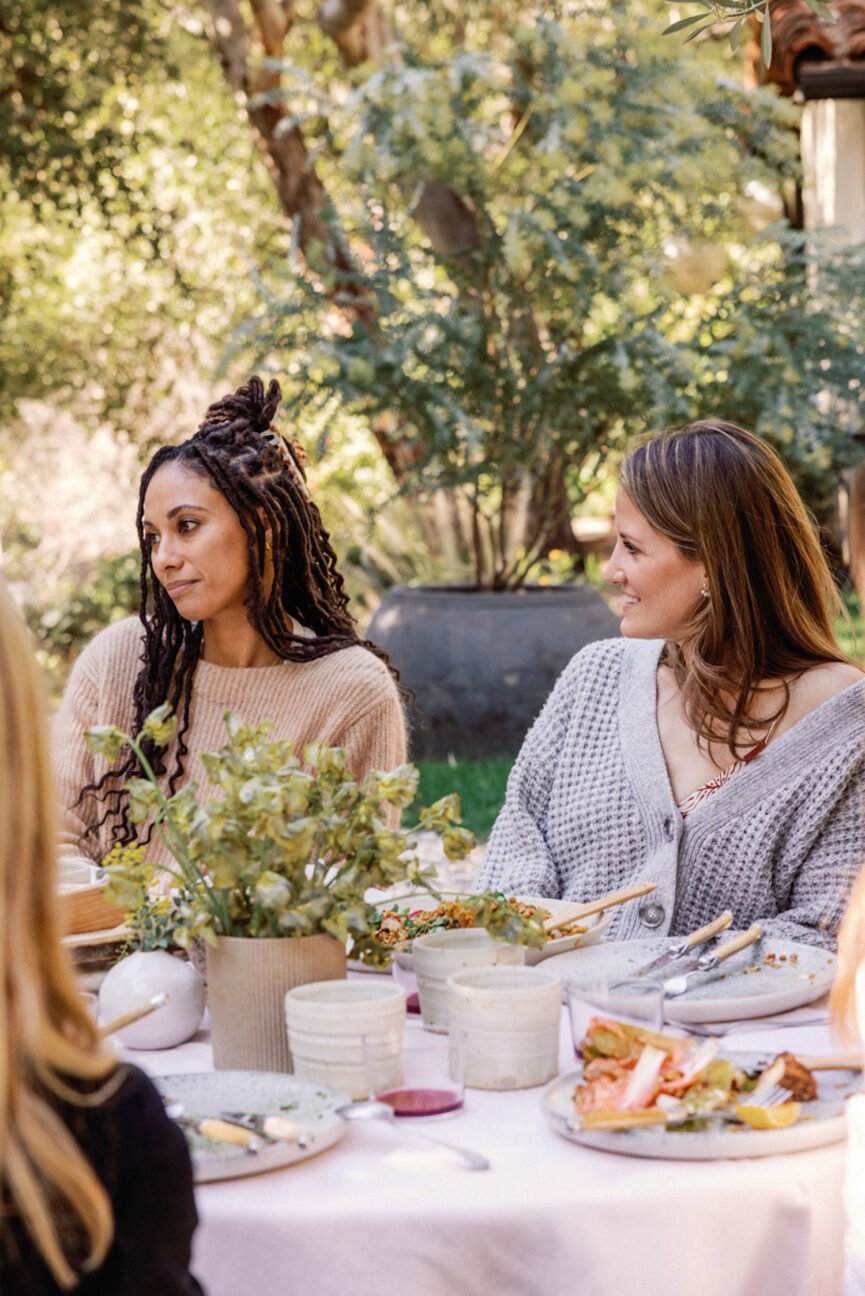In the past, I often found myself tiptoeing around hard conversations, driven by the desire to keep the peace and avoid discomfort. The thought of bringing up topics that might disrupt the natural flow of conversation felt daunting—I worried that my words could cast a shadow over what should be a joyful gathering. However, as the years have passed, I’ve come to understand that these difficult discussions are not obstacles but rather gateways to deeper connections. While the holidays can sometimes be a whirlwind of laughter and cheer, they also provide a unique opportunity to engage in meaningful dialogue that truly resonates and touches upon our shared experiences.
Featured image from our interview with Elisa Marshall by Suruchi Avasthi.

How to Have Hard Conversations to Foster Compassion & Connection
Ultimately, the essence of the holidays lies in connection—celebrating the bonds we share with family and friends. By inviting thoughtful conversation, we create space for reflection, understanding, and empathy. It’s in these candid exchanges that we can discover new facets of each other, reinforcing the love and support that exists in our relationships.
As you navigate the festive season, remember that the hardest conversations can lead to the most rewarding connections.
Embrace the challenge, and allow the spirit of the holidays to guide you toward heartfelt discussions that enrich your connections with those you hold dear.
1. Understanding the Importance of Hard Conversations
Embracing hard conversations means leaning into vulnerability. When we ask the questions that require us to pause, reflect, and dig deeper, we open the door for others to share their truths. This act of courage can transform a casual exchange into a genuine exploration of thoughts, feelings, and experiences that often lie just beneath the surface. It is in these moments of shared openness that we foster a sense of intimacy, allowing us to connect in ways that transcend small talk. After all, the holiday season is an opportunity not just to gather but to truly see one another.
The Role of Vulnerability
Vulnerability serves as the cornerstone of authentic connections. It allows us to peel back the layers we often use to shield ourselves from scrutiny. As I’ve grown older, I’ve learned to value vulnerability all the more. It empowers me to share my fears, uncertainties, and even my joys, inviting others into my inner world. What’s more, vulnerability also fosters an atmosphere of trust and openness. This willingness to be seen in my rawness not only deepens my relationships but also encourages others to reciprocate, creating a cycle of mutual understanding and compassion.
Diving into uncomfortable topics can feel daunting, but as I’ve discovered, it’s in these discussions that we unearth the richest revelations. By addressing the hard truths that linger beneath the surface, we pave the way for transformative dialogue that transcends the superficial. In this space of vulnerability, we discover that our struggles and triumphs resonate far beyond our individual experiences, reminding us that we are never truly alone.
Moving Beyond Small Talk
During holiday gatherings, surface-level conversations often dominate. The result? We’re left with little room for the deeper connections we crave. While small talk serves its purpose, it can feel like a series of polite exchanges that barely scratch the surface of our true selves. This tendency to stick to the safe and familiar limits our interactions. Engaging in meaningful dialogue, on the other hand, creates a sense of intimacy and understanding. By prioritizing these authentic conversations, we have an opportunity to strengthen our bonds and cultivate a more profound appreciation for one another, transforming holiday gatherings into moments of connection and growth.

2. Preparing for Hard Conversations
When it comes to navigating holiday discussions, identifying appropriate topics can set the stage for meaningful dialogue. Consider exploring personal challenges from the past year. You may find that sharing these experiences can encourage empathy and understanding. Family dynamics can also be a good place to start. They allow us to reflect on our roles, relationships, and growth within these relationships.
Of course, be cautious when diving into current events. With this being an election year, emotions may be heightened and you may find it difficult to reach common ground. However, they can also provide an opportunity to engage in thoughtful discussions about the world around us, encouraging diverse perspectives and insights. Be mindful of what may work for your particular context—and realize when it might be most beneficial to step back.
Setting Intentions
Setting clear intentions before engaging in difficult conversations is essential for guiding the dialogue and setting a safe environment. Take a moment to reflect on what you hope to achieve:
- Is it to deepen your understanding of a loved one’s perspective?
- Are you seeking to address a lingering issue or to simply create a space for open expression?
By sharing your intentions, you establish a framework that can help steer the conversation in a positive direction. This clarity not only keeps you focused but also invites others to participate with openness and honesty. As you approach these discussions with intention, you create the potential for transformative connections, letting you navigate these conversations with grace and understanding.

3. Tips for Initiating Hard Conversations
Starting conversations with open-ended questions can be a powerful catalyst for deeper reflection.
- Instead of: “Did you enjoy the holidays?” Try: “What was the most memorable moment for you this holiday season?” or “How did you navigate any challenges this year?”
This will encourage others to share their thoughts and feelings more fully, inviting them to explore their experiences in a way that feels both safe and engaging.
Practicing Active Listening
Remember: It’s not just about hearing the words spoken—it’s about truly understanding the emotions and intentions behind them. By maintaining eye contact, nodding, and offering thoughtful responses, we communicate that we value and respect the other person’s perspective. This not only creates a mutual understanding but also encourages them to be more vulnerable and honest, ultimately deepening the relationship. In a world that often prioritizes quick responses, taking the time to listen actively can transform the quality of our interactions.
Be Mindful of Tone and Body Language
Non-verbal cues are key! Facial expressions, gestures, and posture can impact how our messages are received. For instance, an open posture and warm tone can convey acceptance and empathy, while crossed arms or a flat tone might signal defensiveness or disinterest. By consciously aligning our body language and tone with our message, we create a safe space for dialogue. This not only helps set a positive tone for the conversation but also establishes an environment where everyone feels heard and respected.

4. Navigating Discomfort
Embracing awkwardness is an essential aspect of navigating hard conversations, as discomfort often accompanies moments of vulnerability and authenticity. Acknowledging this unease can transform it from a barrier into a bridge for connection. Rather than shying away from the awkward silences or hesitant pauses, take a moment to breathe deeply. This serves as a reminder that it’s okay to feel uncomfortable. By reframing these moments as opportunities for growth and understanding, we can cultivate a more compassionate approach to hard conversations.
Staying Present
Staying present during challenging discussions is crucial for maintaining a sense of calm and clarity. Mindfulness techniques, such as focusing on your breath or practicing grounding exercises, can help anchor you in the moment. When feelings of anxiety or frustration arise, taking a brief pause to inhale deeply and exhale slowly can create space for reflection and response rather than reaction. By nurturing this mindful awareness, you can engage fully and thoughtfully, transforming potentially overwhelming discussions into moments of connection.
Embracing Hard Conversations as Opportunities for Growth
Ultimately, the goal of these hard conversations isn’t simply to exchange words but to foster deeper understanding and grow stronger in our relationships. By embracing the awkwardness and remaining present, you allow the discomfort to pave the way for growth. As you navigate these tough discussions, remember that the journey toward deeper connection often lies in our willingness to engage with discomfort, ultimately leading you to a place of greater empathy and clarity.



